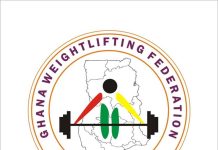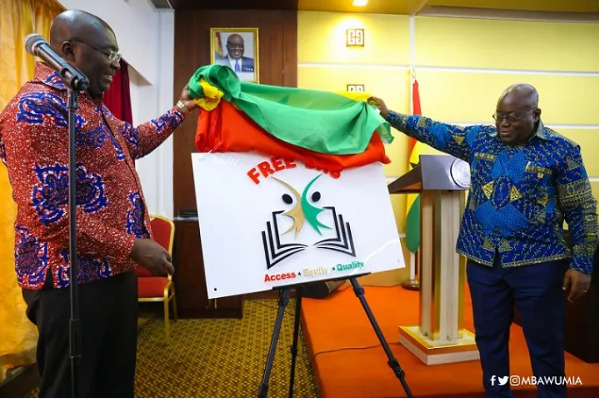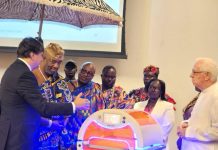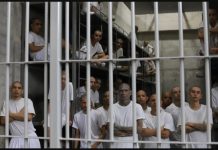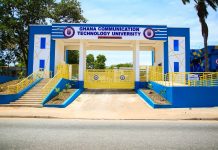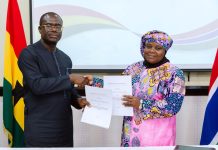NPP GERMANY
PRESS RELEASE
14—11—2024
Free SHS Policy Remains A Transformative Investment In Ghana’s Future; Vote To Secure And Protect It—NPP GERMANY
In 2017, the New Patriotic Party (NPP) government took a monumental step toward securing the future of Ghanaian youth with the launch of the Free Senior High School (SHS) policy.
This initiative, led by President Nana Addo Dankwa Akufo-Addo, set out to provide free secondary education to all qualified students in Ghana, removing the economic barriers that had long hindered many families.
Today, nearly seven years later, the transformative impact of this program is evident, as it has redefined education in Ghana and created unprecedented opportunities for growth, development, and social mobility.
In recent years, the Free Senior High School (SHS) policy championed by President Nana Akufo-Addo and Vice President Dr. Mahamudu Bawumia has become one of Ghana’s most significant social interventions.
This policy isn’t just about relieving families of immediate expenses but represents a visionary commitment to building a prosperous, educated Ghana.
By removing financial barriers to education, the government is empowering the nation’s youth and setting the stage for a brighter future.
The numbers speak for themselves. Today, students entering SHS are spared an annual financial burden of approximately GHS 18,850.
This figure encompasses a wide range of expenses, including admission fees, boarding fees, and even basic supplies.
These costs would have otherwise limited access to quality education for many Ghanaian families. Instead, they are now fully covered, making it possible for countless children from economically challenged backgrounds to pursue their dreams.
Education expenses have historically been a major challenge for parents across the country.
Admission fees alone, set at GHS 3,000, were enough to place secondary education out of reach for many families. Adding in the cost of boarding (estimated at GHS 4,050 per term), uniforms, tuition, books, and examination fees only further elevated the burden.
The Free SHS policy has effectively lifted these financial barriers, and in doing so, it has liberated many young Ghanaians to focus on their studies and future potential.
The impact of the Free SHS policy is visible nationwide. By giving students access to essential items like books, uniforms, and even physical education kits, the government is ensuring that every young Ghanaian has the resources necessary to learn and thrive.
This is not only a monumental investment in individual lives but also a catalyst for national development.
An educated populace will drive innovation, attract investment, and create a foundation for sustainable economic growth.
Critics may argue about the sustainability of the Free SHS policy, but the benefits it delivers are undeniable. Access to quality education is a proven pathway out of poverty and inequality.
Every pesewa spent on the Free SHS program is an investment in Ghana’s future, as educated citizens are more likely to contribute positively to society, become informed voters, and be productive members of the workforce.
The government’s bold commitment to this policy highlights its belief in the transformative power of education.
President Akufo-Addo and Vice President Bawumia’s leadership in implementing Free SHS is making history—not just as a policy but as a promise that every child, regardless of financial background, has a right to education.
This initiative stands as a remarkable achievement and is something all Ghanaians can be proud of.
In the long term, Free SHS will reshape Ghana’s social fabric by fostering equality and promoting merit.
For parents, it brings a sense of relief, knowing their children can access quality education without financial stress.
For students, it provides an environment where they can learn, dream, and prepare for a future they may have once thought out of reach.
For the nation, it is a solid foundation on which to build a more just, equitable, and prosperous society.
With Free SHS, Ghana is setting an example for the continent, showing that quality education can and should be accessible to all.
This policy is indeed an inspiring legacy that will yield returns for generations to come.
Expanding Access to Education
The Free SHS policy has provided secondary education to more than 1.6 million Ghanaian students since its inception.
According to data from the Ministry of Education, enrollment in senior high schools has increased by 69% between 2017 and 2023, with a leap from approximately 900,000 students in 2016 to over 1.5 million in 2023.
This dramatic rise demonstrates the effectiveness of the Free SHS policy in bringing education to more Ghanaian households.
In regions that traditionally faced higher dropout rates due to economic hardships, such as the Northern and Upper East regions, enrollment rates have seen particularly noteworthy improvements.
Bridging Socioeconomic Inequality
One of the most significant accomplishments of Free SHS has been its role in narrowing socioeconomic disparities.
Previously, families with limited financial resources often faced difficult choices about prioritizing the education of one child over another.
Today, Free SHS ensures that a family’s financial standing does not determine a child’s educational future.
The policy has especially benefited families from rural and marginalized communities, giving children who might have been left behind a fair chance to achieve their potential.
According to a 2021 report from the World Bank, nearly 30% of students who accessed secondary education through Free SHS were from low-income households that would otherwise not have afforded the cost of education.
Improving Academic Performance and Resources
Since the introduction of Free SHS, the government has invested significantly in infrastructure, resources, and personnel to support the influx of students.
According to the Ministry of Education, over 1,200 school projects have been initiated across the country, including classroom blocks, dormitories, and libraries.
Additionally, Free SHS has provided students with essential learning materials, such as textbooks and science equipment, which were previously a financial burden on families.
The results of these improvements are evident in Ghana’s national and international examination performances.
For instance, the pass rate for the West African Senior School Certificate Examination (WASSCE) has consistently improved, with Ghanaian students recording higher scores in English, Mathematics, and Integrated Science since 2019.
In 2021, Ghanaian students achieved a 65% pass rate in core subjects—a marked improvement from prior years—signaling that Free SHS is not only expanding access but also raising academic standards.
Enhancing Ghana’s Economic Future
The broader economic benefits of Free SHS are substantial. By producing a more educated workforce, the policy is poised to contribute to long-term economic growth.
An educated population tends to be more innovative, productive, and capable of adapting to new industries, which is crucial for Ghana’s ambitions in sectors like technology, healthcare, and energy.
The World Bank has estimated that Ghana’s economy could grow an additional 1-2% per year by 2030, partly due to the investments in education spurred by Free SHS.
Moreover, the program has helped alleviate the financial burden on families, allowing them to allocate resources to other economic activities.
By 2023, the policy had saved families an estimated GHS 5.8 billion in education-related expenses, enabling many to reinvest in their businesses, improve household welfare, and stimulate local economies.
A Legacy Worth Celebrating
While Free SHS has faced challenges—such as overcrowding in classrooms and the strain on educational infrastructure—the government’s commitment to addressing these issues shows a dedication to sustainable improvement.
Plans are underway to build additional schools, expand facilities, and recruit more teachers, all aimed at enhancing the quality of education for future generations.
Free SHS is more than just a policy; it is a legacy that will impact the nation for decades to come.
It has made secondary education a basic right rather than a privilege, an achievement that positions Ghana as a leader in educational access in Africa.
As we look forward, it’s essential to recognize and celebrate the NPP government’s foresight and bold leadership in making this transformative policy a reality.
The Free SHS program is not only a victory for students and families but a triumph for Ghana’s future.
Together, we are building a better and prosperous Ghana!
May God bless our nation, and may we continue to work together towards a brighter, more prosperous future.
We will continue to urge the good people of Ghana to vote NPP and break the 8 in order to retain the NPP so that the next NPP administration in the helm of governance will continue to give off its best.
We Say KUDOS to Nana Addo-Dankwa Akufo-Addo and his government!!!
Let The Truth Confound The Wise……
God Bless Our Homeland Ghana!!!
Long live FREE SHS!
Long Live Nana Addo-Dankwa Akufo-Addo!!
Long Live the Elephant Party!!!!
Kukruduuuu Eeeessshiii!!!!
Signed:
Nana Osei Boateng
NPP Germany Branch
Communications Director












